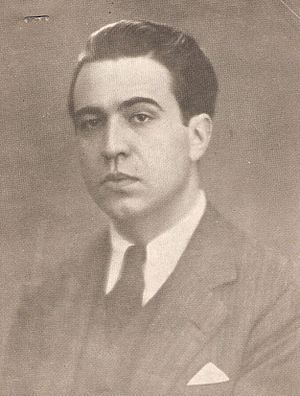Jaime Torres Bodet facts for kids
Quick facts for kids
Jaime Torres Bodet
|
|
|---|---|
 |
|
| 2nd Director-General of the UNESCO | |
| In office 1948–1952 |
|
| Preceded by | Julian Huxley |
| Succeeded by | John Wilkinson Taylor (acting) |
| Personal details | |
| Born | 17 April 1902 Mexico City, Mexico |
| Died | 13 May 1974 (aged 72) Mexico City, Mexico |
| Resting place | Panteón de Dolores |
| Occupation | Diplomat and writer |
| Awards | Belisario Domínguez Medal of Honor |
Jaime Mario Torres Bodet (born April 17, 1902 – died May 13, 1974) was an important Mexican politician and writer. He worked for three different Presidents of Mexico as a cabinet member. He also led the United Nations Educational, Scientific and Cultural Organization (UNESCO).
Contents
Early Life and Education
Jaime Torres Bodet was born in Mexico City. His mother, Emilia Bodet Levallois, was from Peru with French family roots. His father, Alejandro Torres Girbent, was from Barcelona, Spain. They met in Peru, got married, and moved to Mexico in the late 1800s. Jaime's father promoted operas and theater, which made a big impression on young Jaime.
Jaime's parents really valued books and art. His mother taught him piano, reading, and French at home. This helped him start school directly in the third grade. In 1912, when he finished sixth grade, he received many books as gifts, including a collection by Benito Pérez Galdós. He went to high school at the National Preparatory School, where he started developing his writing skills. He became friends with other young writers like José Gorostiza and Carlos Pellicer.
Torres Bodet grew up during the Mexican Revolution. He published his first book of poems when he was just 16 years old.
Career Highlights
Jaime Torres Bodet was very good at languages. He learned French as a child, which helped him a lot in his writing and diplomatic jobs. Later, he also learned English and Italian.
Early Roles in Education
When he was only 18, in 1920, Torres Bodet became an administrator at the National Preparatory School. He also taught literature at the School of Advanced Studies. In 1921, José Vasconcelos, a famous educator, made him his personal secretary. Soon after, Torres Bodet became the head of libraries for the Secretariat of Public Education. He also helped start a magazine called Falange with his friends. Later, he worked at the National University (now UNAM) to help create the rules for Mexico's new education system.
Writing and Literary Groups
In 1929, Torres Bodet published a book of poems called Biombos, Poesias, Destierro. In the same year, he and his friends started a magazine called Los Contemporáneos (The Contemporaries). This group of writers, including Salvador Novo and Xavier Villaurrutia, wanted to promote a new style of poetry. Their magazine was seen as different from the popular revolutionary ideas of the time because it focused on art, not politics.
From 1938 to 1941, he worked with younger writers like Octavio Paz on a project called Taller Poético (Poetic Workshop). Torres Bodet also knew many other famous writers, such as Federico García Lorca and Paul Valéry.
Public Service and Diplomacy
Torres Bodet held many important government jobs. He was the Secretary of Public Education from 1943 to 1946 under President Manuel Ávila Camacho. He then became the Secretary of Foreign Affairs from 1946 to 1951 under President Miguel Alemán Valdés.
He also served as Mexico's ambassador to France from 1954 to 1958. Later, from 1958 to 1964, he was again appointed Secretary of Public Education by President Adolfo López Mateos. Torres Bodet strongly believed that education was the key to solving many of Mexico's problems, like crime and unemployment. He thought that good education, especially job training, could help people a lot.
Between 1929 and World War II, Torres Bodet worked as a diplomat in cities like Madrid, The Hague, Paris, Buenos Aires, and Brussels.
Leading UNESCO
One of his most important international roles was serving as the Director-General of the United Nations Educational, Scientific and Cultural Organization (UNESCO) from 1948 to 1952. UNESCO works to promote peace and understanding through education, science, and culture around the world.
Later Life and Legacy
In 1954, Torres Bodet lost sight in one eye. He retired from public life after his second time as Secretary of Public Education. He spent his last years writing his memoirs, which are his life story.
In 1971, he received the Belisario Domínguez Medal of Honor from the Mexican Senate. This is one of Mexico's highest awards. He was also a member of the Mexican Language Academy and the National College, which are important groups for writers and thinkers in Mexico.
Jaime Torres Bodet passed away in 1974 in Mexico City after a long illness.
See also
 In Spanish: Jaime Torres Bodet para niños
In Spanish: Jaime Torres Bodet para niños
 | Shirley Ann Jackson |
 | Garett Morgan |
 | J. Ernest Wilkins Jr. |
 | Elijah McCoy |

